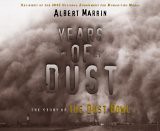
You know the photograph. Even if you didn't know the name of it, you've seen that photo before. It's everywhere. If you've ever read or looked at anything about the Depression, about the Dust Bowl, about migrant workers, her face is there.
She has a name. For years it was lost to time-- photographer Dorothea Lange never thought to ask. Florence Owen Thompson.
She hated that photo. She hated the story that went with it-- "Destitute in a pea-pickers came, because of the failure of the early pea crop. The people had just sold their tent in order to buy food." Thompson and her family were poor and they were migrant workers. They didn't live in the pea-pickers camp where Lange took the picture, nor had they just sold their tent. Their car broke down on the highway. The boys went into town to get it fixed and Thompson set up a quick lean-to right before Lange arrived on the scene. But beyond the factual errors, Thompson felt that it reduced her and her family to a stereotype and she was upset that she never saw any money from the photo. (Lange was working for the government, so everything created was automatically public domain. Lange never saw direct money from the photo, either, although it certainly helped her career.)
But more than telling the stories of Lange and Thompson, this slim volume discusses the Depression itself, the artistry of the composition of the photograph, and explores why it resonated so well at the time and today. It also explores the impact the photo made. If nothing else, when it ran in the newspaper a few days later, food relief was sent to the starting pea-pickers. Thompson and her family were long gone by that point, but other starting workers were still there. While I love learning the real story behind the photo, I also really appreciated the analysis of why it works and why it works so well.
Several of Lange's other Depression-era photographs are included as well.
Book Provided by... the publisher, for Cybils consideration
Links to Amazon are an affiliate link. You can help support Biblio File by purchasing any item (not just the one linked to!) through these links. Read my full disclosure statement.




